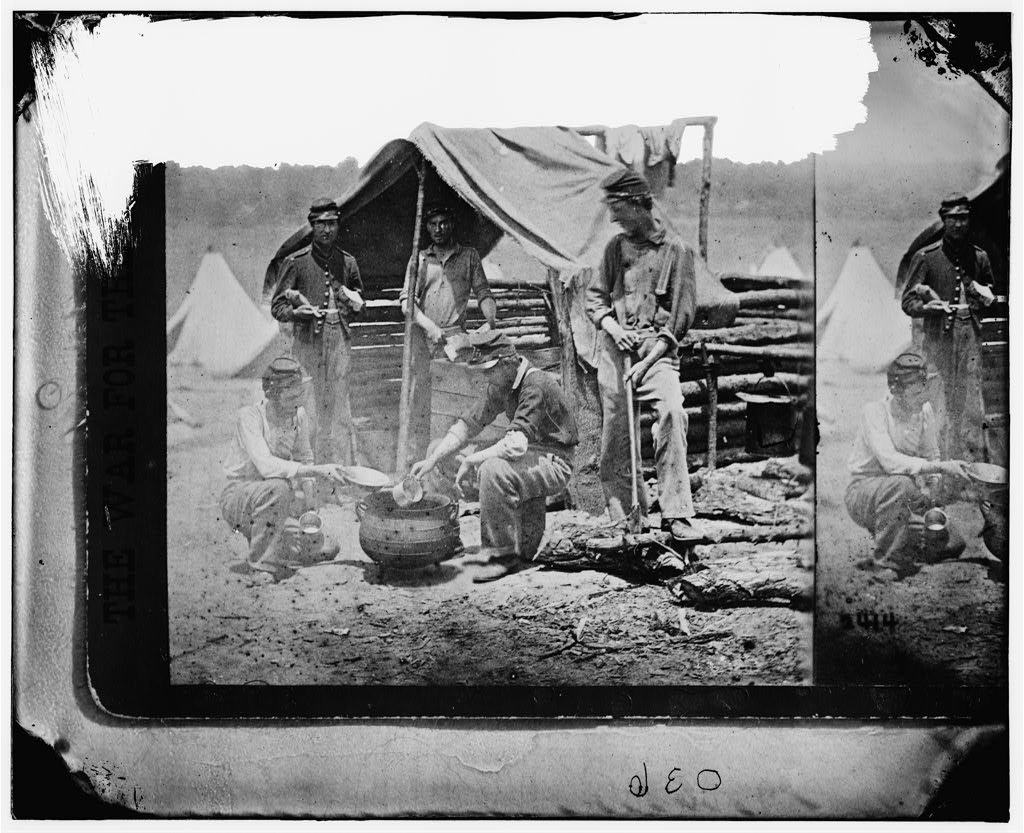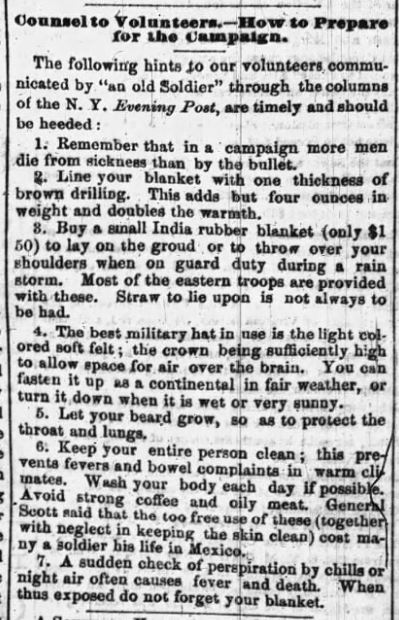“Advice to Soldiers” Goes Viral

Long before the invention of the World Wide Web, certain stories tended to “go viral” via the medium of period newspapers. It was not an uncommon practice for newspapers to print other newspapers’ articles—many times word-for-word—in effort to fill space and save the time and trouble of having to have someone compose a story. Such a case arose in the spring of 1861.
After the firing on Fort Sumter and during the early phase of the Civil War in which the citizens of both the United States and the Confederate States exhibited what historians term rage militaire, which is the expression of intense enthusiasm for armed conflict, a brief numbered list ran in newspapers across a now divided America.
It is difficult to determine exactly which newspaper first ran the article, but it appears that an early appearance came in the April 23, 1861, edition on the fourth and final page of the Bangor, Maine, Weekly Courier. They titled it: “Counsel to Volunteers.” Other papers used “Advice to Volunteers,” “Advice to Soldiers,” and “To Our Young Soldiers.”
The original author of the short piece was only noted as “an Old Soldier.” Sometimes the newspaper posting the article shared the source they borrowed it from, others did not. Many included a line such as the Lansing, Michigan, State Journal did when they printed it on May 1: “How to Prepare for the Campaign—The following hints to our volunteers are timely, and should be heeded.”
What followed were seven practical pieces of advice leaned through the hard-learned experience of the “Old Soldier.” Due to a couple of references, one wonders if perhaps the pseudonymed author served in the Mexican-American War. All seven informed suggestions offered enlistees sound guidance on how to maintain their health and increase their comfort in camp and on campaign.
The following are offered in the order that they appear in the widely reprinted article:
- Remember that in a campaign more men die from sickness than by the bullet.
- Line your blanket with one thickness of brown drilling this adds but four ounces in weight, and doubles the warmth.
- Buy a small India rubber blanket (only $1.50) to lay on the ground or to throw over your shoulders when on guard duty during a rain storm. Most of the eastern troops are provided with these. Straw to lie on is not always to be had.
- The best military hat in use is the light-colored soft felt; the crown being sufficiently high to allow space for air over the brain. You can fasten it up as a continental in fair weather, or turn it down when it is wet or very sunny.
- Let your beard grow, so as to protect the throat and lungs.
- Keep your entire person clean; this prevents fevers and bowel complaints in warm climates. Wash your body each day, if possible. Avoid strong coffee and oily meat. Gen. [Winfield] Scott said that the too free use of these (together with neglect in keeping the skin clean) cost many a soldier his life in Mexico.
- A sudden check of perspiration by chilly or night air often causes fever and death. When thus exposed do not forget your blanket.

As mentioned above, the brief list ran primarily in April, May, and June 1861, in an array of newspapers in big cities and small towns like Buffalo, New York; Monticello, Indiana; West Chester, Pennsylvania; Macon, Georgia; Montgomery, Alabama; Montpelier, Vermont; Fayetteville, North Carolina; Muscatine, Iowa; Boston, Massachusetts; New York City; Clarksville, Tennessee; Marion, Alabama; Raleigh, North Carolina; Harrisburg, Pennsylvania; Cleveland, Ohio; Racine, Wisconsin; Towanda, Pennsylvania; Sacramento, California; Rock Island Illinois; Dallas, Texas; Davenport, Iowa; Atlanta, Georgia; Richmond, Virginia; Smyrna, Delaware; Charleston, South Carolina; Hartford, Connecticut; Baltimore, Maryland, and many, many more. It even made an appearance in the 1861 edition of The Soldier’s Guide: A Complete Manual and Drill Book for the Use of All Volunteers, Militia, and the Home Guard.
This example of early war viral news provides us with a couple of things to think about. First, people obviously believed the advice that “Old Soldier” offered was sound enough to share to the men from their communities who might be heading off to war. They wanted to offer their soldiers the best chances possible to return home safe and healthy. Second, it shows how widely newspapers circulated throughout the newly divided nation. Many newspapers subscribed to other newspapers primarily to get information like the article highlighted here. The coming of the war in earnest would largely curtail that practice between the belligerent sections, but never totally stop it.
Great article with excellent advice to young soldiers. The copying of articles isn’t surprising. Many community newspapers didn’t have large staff. They needed more than ads to fill out the pages.
I’ve run across this same viral article in many papers. Thanks for sharing!
Thanks, Tim, for a really interesting article about a guideline for recruits. Also interesting as to how wide spread the advice traveled.
Tim, Great piece … thanks for this life saving advice … as recommended by General Scott, I have given up “oily meat,” but can’t seem to kick the “strong coffee” … guess i will just take my chances.
Very interesting. Thank you for sharing this. Do you know what is “brown drilling,” mentioned in reference to blankets?
“Drill” fabric is tightly woven cotton. It was highly durable and often used in work wear.
Tim, thank you. Clearly, both you and the anonymous advice-giver know your stuff.